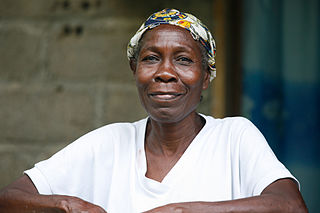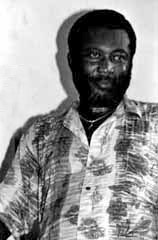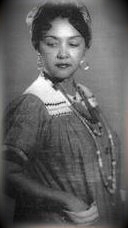Related Research Articles

Haiti, officially the Republic of Haiti, is a country on the island of Hispaniola in the Caribbean Sea, east of Cuba and Jamaica, and south of The Bahamas. It occupies the western three-eighths of the island, which it shares with the Dominican Republic. Haiti is the third largest country in the Caribbean, and with an estimated population of 11.4 million, is the most populous Caribbean country. The capital and largest city is Port-au-Prince.

François Duvalier, also known as Papa Doc, was a Haitian politician who served as the president of Haiti from 1957 until his death in 1971. He was elected president in the 1957 general election on a populist and black nationalist platform. After thwarting a military coup d'état in 1958, his regime rapidly became more autocratic and despotic. An undercover government death squad, the Tonton Macoute, indiscriminately tortured or killed Duvalier's opponents; the Tonton Macoute was thought to be so pervasive that Haitians became highly fearful of expressing any form of dissent, even in private. Duvalier further sought to solidify his rule by incorporating elements of Haitian mythology into a personality cult.
Melville Jean Herskovits was an American anthropologist who helped to first establish African and African Diaspora studies in American academia. He is known for exploring the cultural continuity from African cultures as expressed in African-American communities. He worked with his wife Frances (Shapiro) Herskovits, also an anthropologist, in the field in South America, the Caribbean and Africa. They jointly wrote several books and monographs.

Haitian Vodou is an African diasporic religion that developed in Haiti between the 16th and 19th centuries. It arose through a process of syncretism between several traditional religions of West and Central Africa and Roman Catholicism. There is no central authority in control of the religion and much diversity exists among practitioners, who are known as Vodouists, Vodouisants, or Serviteurs.
Latin American studies (LAS) is an academic and research field associated with the study of Latin America. The interdisciplinary study is a subfield of area studies, and can be composed of numerous disciplines such as economics, sociology, history, international relations, political science, geography, cultural studies, gender studies, and literature.

Pauline Alice Maier was a revisionist historian of the American Revolution, whose work also addressed the late colonial period and the history of the United States after the end of the Revolutionary War. She was the William R. Kenan, Jr. Professor of American History at the Massachusetts Institute of Technology (MIT).
Patrick Bellegarde-Smith is a professor emeritus of Africology at the University of Wisconsin–Milwaukee. Bellegarde-Smith is an associate editor of the Journal of Haitian Studies and former president of the Haitian Studies Association and the Congress of Santa Barbara (KOSANBA), a scholarly association for the study of Vodou and other African-derived religions.

Haiti is a majority Christian country. For much of its history and up to the present day, Haiti has been prevailingly a Christian country, primarily Roman Catholic, although in practice often profoundly modified and influenced through syncretism. A common syncretic religion is Vodou, which combined the Yoruba religion of enslaved Africans with Catholicism and some Native American strands; it shows similarities, and shares many deity-saints, with Cuban Santería and Brazilian Candomblé. The constitution of Haiti establishes the freedom of religion and does not establish a state religion, although the Catholic Church receives some preferential treatment.
Marie Thérèse Alourdes Macena Champagne Lovinski (1933–2020), also known by the name Mama Lola, was a Haitian-born manbo (priestess) in the African diasporic religion of Haitian Vodou. She had lived in the United States since 1963.

Women in Haiti have equal constitutional rights as men in the economic, political, cultural and social fields, as well as in the family.
Max Gesner Beauvoir was a Haitian biochemist and houngan. Beauvoir held one of the highest titles of Voudou priesthood, Ati or "Supreme Serviteur", a title given to Houngans and Mambos who have a great and very deep knowledge of the religion, and status within the religion. As Supreme Serviteur, Max was seen as a high authority within Vodou.

Levoy Exil, is a master Haitian artist and painter; he is one of the main contributors to the Saint Soleil art movement.
Karen McCarthy Brown was an anthropologist specializing in the anthropology of religion. She is best known for her groundbreaking book Mama Lola: A Vodou Priestess in Brooklyn, which made great strides in destigmatizing Haitian Vodou. Until her retirement in 2009 due to illness, McCarthy Brown was a Professor of Anthropology at Drew University. At Drew University, McCarthy Brown was the first woman in the Theological School to receive tenure and to achieve the rank of full professor.
The religion of Haitian Vodou has been present in Cuba since at least the 18th century. It was transmitted to the island by Haitian migrants, the numbers of whom grew rapidly in the early 20th century, and is primarily practised by their descendants. It is distributed primarily in eastern parts of the island, especially in Oriente. In Cuba, some practitioners of Haitian Vodou have also become involved in the related Afro-Cuban religion of Santería.

Lina Mathon-Blanchet was a Haitian pianist, music teacher and composer. First director of the Conservatoire National, she was interested in Haiti's folkloric traditions and was one of the first performers to include Vodou-influenced theatrical performances on the public stage in the country. Founding several folkloric troupes, she led her artists on tours throughout the United States and was noted as a teacher and mentor to many prominent Haitian performers. Trained in classical music traditions she collected traditional songs documenting the lyrics, melodies, and rhythms found as traditional themes in Haitian music. She is widely recognized as one of the most influential figures in the development of music in Haiti in the twentieth-century.

Voodoo: Truth and Fantasy is a 1993 illustrated monograph on Haitian Vodou. Written by the Haitian sociologist of religion Laënnec Hurbon, and published in pocket format by Éditions Gallimard as the 190th volume in their 'Découvertes' collection.
Bondye, also known Gran Maître, is the supreme creator god in the African diasporic religion of Haitian Vodou. Vodouists believe Bondye was responsible for creating the universe and everything in it, and that he maintains the universal order. They nevertheless deem him to be transcendent and thus inaccessible to humans, who must instead interact with spirits called lwas.
Claudine Michel is the editor of the Journal of Haitian Studies and a professor emerita of Black studies at the University of California, Santa Barbara. Michel is the Director of the UCSB Center for Black Studies Research. She is a Haitian native and practitioner of Haitian Vodou, and has done much in the field of Haitian studies.

Elizabeth A. McAlister is a scholar of Religious Studies, and African-American studies, and feminist, gender, and sexuality Studies at Wesleyan University in Middletown, Connecticut. She is known for her contributions in Afro-Caribbean religions, Haitian Vodou, Pentecostalism, race theory, transnational migration, Caribbean musicology, and evangelical spiritual warfare.
References
- ↑ Okpewho, Isidore; Nzegwu, Nkiru (2009). The New African Diaspora. Indiana University Press. p. 315. ISBN 978-0-253-22095-0.
- ↑ "KOSANBA homepage". Archived from the original on 2019-04-22. Retrieved 2019-04-22.
- ↑ "KOSANBA Declaration". Archived from the original on 2019-04-22. Retrieved 2019-04-22.
- ↑ "KOSANBA Events". Archived from the original on 2019-04-22. Retrieved 2019-04-22.